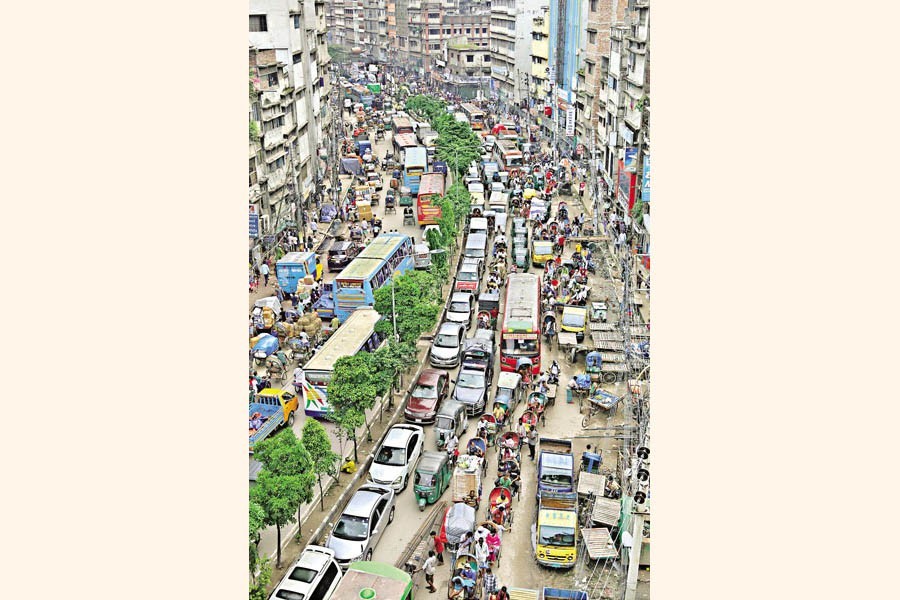Dhaka gets back its usual looks amid traffic bustle with resumption of public transports, offices and trades as Bangladesh, attuned to reopening outer world, unlocked Wednesday all sectors but education.
"As if life gets back its rhythm somewhat as consecutive 19 days of restrictions in the latest spell to contain Covid-19 pandemic from spreading were lifted," says a spot account of the reopening, though in an ambiance of new normal.
Curbs on academic campuses and assemblies inclusive of political gatherings continue as, the government says, risks are involved as the viral transmission stays on a high plateau.
However, the incidence of the mortal disease gave a look of climb-down on the day with the health department disclosing 237 deaths out of 10,420 cases in the latest 24 hours' count.
Despite wasting valuable time getting trapped in nagging traffic congestion, the city commuters were found happy having transports that cost them comparatively low.
It was also found that the transport operators resumed their operation not following the government instructions to run half of the transports with capacity passengers as majority of the buses were seen operating on the streets on the first day after the latest lockdown regime was over.
But the transport operators were observed not allowing passengers without masks while a very few buses were taking passengers above their capacities. As most of the vehicles were running, gridlock roads have surfaced back in almost every area of the capital although the country is now passing through the most critical time of the Covid-19 pandemic due to an alarming spread of the viral disease as yet.
Md. Jasim, helper of Victor Classic, a Sadarghat-bound bus from Gazipur, said they resumed their service following the government orders as they did not allow passengers without masks and beyond their capacity.
"I think most of the buses are on the streets now after a long time. I did not hear any bus not plying today," he replied when asked about the government-set condition on operating half the transports of a fleet.
Contacted, secretary-general of Bangladesh Road Transport Owners Association Khandoker Enayet Ullah said they conveyed the message of the condition to operate half the number of vehicles. "We tried hard to convince the operators to operate half of the transports but we are yet to be successful. We will keep trying to convince them even though we know it will create a crisis of transport," he added.
Considering country's current socioeconomic condition and to keep the wheel of economy rolling, the government relaxed the restrictions and allowed shops to reopen, public transports and offices to resume operations.
The relaxation of lockdown rules has brought some sort of relief for commuters, transport operators and workers, vendors, traders and retailers who had suffered much because of the hard restrictions on movements of people, transports and businesses since July 1st, excepting an 8-day break for celebration of Eid-ul-Azha.
Visiting different places in the capital, including Gulistan, Sadarghat, Jatrabari, Shanirakra, New Market, Jigatola and Dhanmondi FE correspondents found increased numbers (thousands) of people coming outdoors but most highly reluctant to follow the health-safety guidelines to prevent themselves from contracting coronavirus.
All the tea stalls in different areas were mostly crowded where both the customers and the tea sellers did not wear facemasks and failed to maintain 'social distancing'.
When asked, both the customers and a makeshift tea-shop owner located at Dholpur candidly said as they had felt some uneasiness so they preferred not to wear masks despite knowing the risks of infection.
They, however, admitted that when they see law enforcers, then they put on facemasks to show their compliance.
A police sergeant near Polashi intersection told the FE that they had been working to check traffic jams due to the mobility and the plying of an increased number of cars on roads.
He admitted that people were ignoring health-safety protocol during the ongoing pandemic. They did not face any traffic jam during the immediate-past lockdown following the restrictions that did not allow public transports, private cars and CNG-run auto-rickshaws plying the roads without valid reasons.


